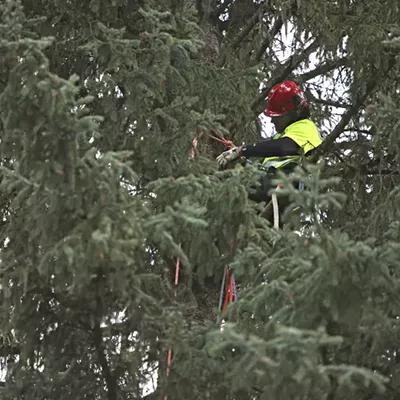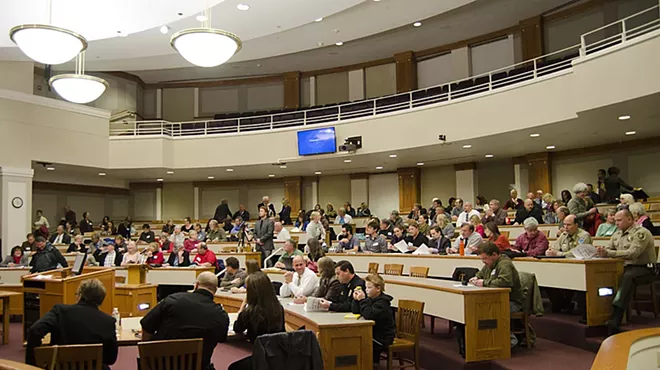Friday, November 1, 2013
Criminal Justice Commission offers 43 ideas for police, jail and court reforms
In an ambitious and wide-ranging report, the Spokane Regional Criminal Justice Commission has released its long-awaited recommendations on reshaping the county's criminal justice system toward increased efficiency, offender rehabilitation and alternative justice strategies.
Formed in November of 2012, the three-person commission spent hundreds of hours interviewing local law enforcement officials, justice representatives and rehabilitation experts. The commission found a number of redundancies and outdated approaches they would like see modernized. Many recommendations involve combining services or better utilizing technology. The commission has also endorsed many of the alternative justice programs championed by the local Smart Justice initiative.
They have released a 58-page report listing at least 43 proposals for reforming the Spokane County Sheriff's Office, the Spokane Police Department, the Prosecutor's Office, the Public Defender's Office, the Superior, District and Municipal courts, probation services and the jail system.
"It has become clear to us that the regional criminal justice system is maladapted for current and future needs," the report states. "As it exists, it is stove-piped and inefficient. … There is a lack of trust, no unified leadership, duplicated services between and among jurisdictions across the system, and it unnecessarily costs the City and County taxpayers thousands of extra dollars each day."
Commissioners singled out the county Juvenile Court and the Adult Drug Court as "pockets of excellence" that had demonstrated commitments to adopting best practices. Other departments lagged behind, specifically the county District Court, which was cited as unorganized and unwilling to embrace needed reform.
"We approached our task humbly and with the utmost respect for the hundreds of professionals that work in our regional criminal justice system," the commission writes. "We are inspired by the passion and dedication of the people who work tirelessly to maintain our criminal justice system, frequently with reduced resources. … The recommendations we make in the following report should not be view as diminishing the current work being performed by those [individuals]."
In hopes of advancing their recommendations, the commission has suggested city and county officials make a permanent commission and establish a Law and Justice Coordinating Committee to oversee reform efforts. Commissioners argue creating those governing bodies, with authority to dictate necessary changes, will be essential to a successful transition.
"In short, the [commission] must be free from the politics that now hamper progress," the report states.
With a timeline to introduce reforms over the next five years, the report outlines a number of specific recommendations for the individual branches of the justice system. Here are some of the highlights:
GOVERNING:
- Create Spokane Regional Justice Commission and hire staff.
- Re-establish the Law and Justice Coordinating Committee.
- Develop an "evidence-based" risk assessment system to evaluate and manage offenders across all departments.
- Improve regular reporting and track program successes.
TECHNOLOGICAL EFFICIENCIES:
- Use video conferencing to improve communication and access between courts and jail.
- Consolidate case record and management systems to get different departments on the same records software.
LAW ENFORCEMENT:
- Establish a LEAD (Law Enforcement Assisted Diversion) program to divert low-level drug and prostitution offenders into rehabilitation programs instead of incarceration. Based on King County LEAD program (www.leadkingcounty.org).
- Consider Ceasefire anti-gun violence strategy, which combines extensive community outreach with stronger punishments for gun crimes.
- Expand Crisis Intervention Team training to all law enforcement agencies to improve police interactions with the mentally ill. The Spokane Police Department has already committed to putting all officers through the 40-hour program.
- Combine administrative and logistical functions such as dispatch, fleet management and regional intelligence.
PRE-TRIAL ASSESSMENT:
- Create a 24-hour intake Community Corrections Center to act as a temporary clearinghouse for minor offenses. The center would help triage people into jail, social services, drug treatment or other programs.
- Expand diversion programs and use of electronic home monitoring.
COURTS:
- All courts should emulate the county Juvenille Court, which has introduced new risk-assessment tools and follow-up programs.
- Consolidate a single defendant's multiple charges under a single court to streamline processing across different jurisdictions.
- Work to reduce mandatory court appearances, warrants and incarceration over unpaid Legal Financial Obligations.
- Punish probation violations with "swift and certain" sanctions, which have been shown to have a stronger effect on behavior.
- Expand Adult Drug Court, another "pocket of excellence" the commission would like to see grow. Officials should also review other therapeutic courts to evaluate their effectiveness.
- Pursue legislation that would remove mandatory minimums at the state level.
- Spokane County should develop a driving-while-license-suspended re-licensing program.
PUBLIC DEFENSE:
- Jail should work to make defendants more available to their attorneys via video conferencing, phone or email.
JAIL DETENTION SERVICES:
- Create a Community Corrections Center, which would provide transitional housing and eventually replace the Geiger Corrections Center.
- Improve prisoner transportation scheduling.
- Expand use of alternative sentencing and electronic home monitoring.
PROBATION SERVICES:
- Combine city and District Court probation services to reduce duplication.
- Reduce probation workloads to reasonable numbers to ensure proper supervision.
The newly released commission draft report does not tackle funding for many of these programs other than suggesting many should be paid for jointly by the city and the county. They acknowledged several programs may require a significant upfront investment to get started, suggesting a county sales tax as well as grant funding.
"A detailed budget is beyond the scope of this report," the commission writes. "Given the number of recommendations put forth above, it would be too complicated to develop at this initial step in the process."
Commissioners expressed hope that their recommendations could lead to a more efficient, more nuanced and more just local criminal justice system. They have scheduled a public hearing at 6 pm Wednesday at the Gonzaga Law School Courtroom to hear initial feedback on the draft report.
"The SRCJC and community have been promised that this report will not be 'put on the shelf,'" the commission states, "and it is our hope that the City and County will follow through on this promise to carry out the recommended reforms."
Read the entire report here:
Tags: Spokane Regional Criminal Justice Commission , Spokane Police Department , Spokane County Sheriff's Office , police reform , police , court , News , Image



















